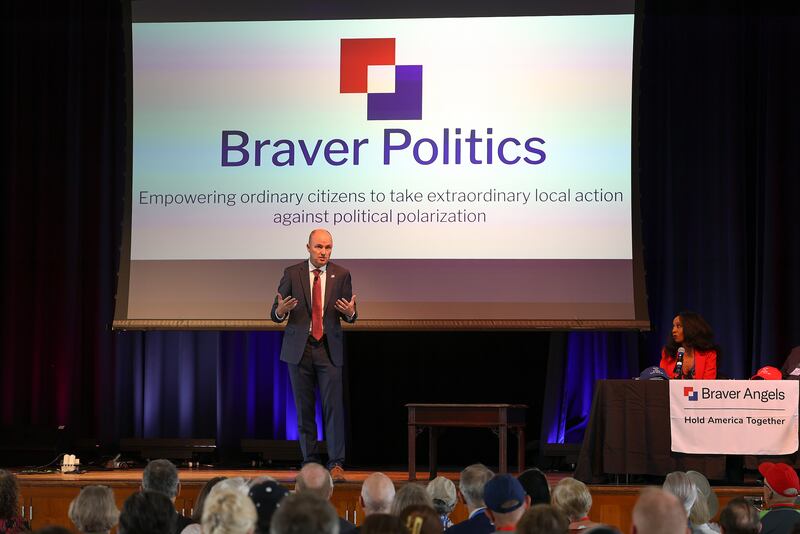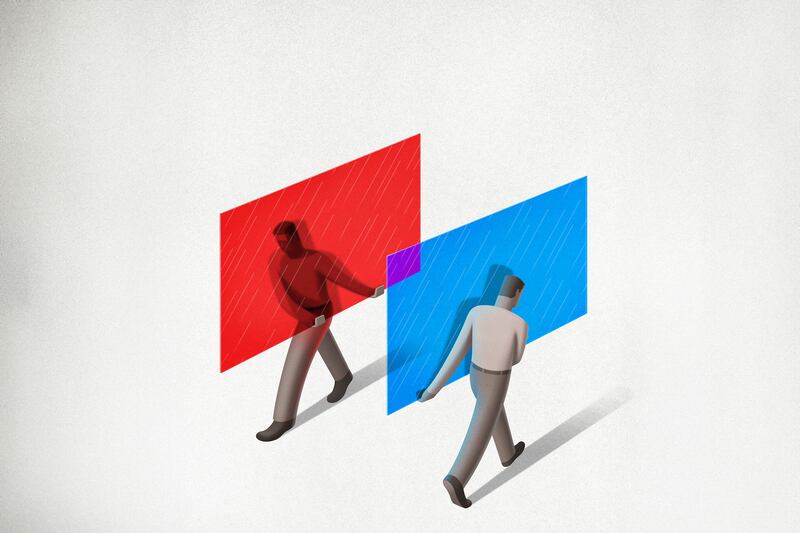Editor’s note: This story is part of Deseret Magazine’s January/February double issue addressing political polarization. Wednesday evening, Utah Gov. Spencer Cox and Maryland Gov. Wes Moore will speak at National Cathedral in Washington, D.C., in a forum titled “With Malice Toward None, With Charity for All,” highlighting Cox’s efforts as chairman of the National Governors Association to “Disagree Better.”
The event is in partnership with the Wheatley Institute at Brigham Young University and Wesley Theological Seminary, and sponsored by Deseret Magazine. The event also features a conversation with ABC’s Donna Brazile, attorney Rachel Brand, legal scholar Ruth Okediji and activist Tim Shriver.
In July 2023, I was honored to be elected by my fellow governors to serve as the chair of the National Governors Association and immediately launched an effort we titled “Disagree Better: Healthy Conflict for Better Policy.”
That title was quite deliberate.
Rather than suggest we need more civility or bipartisanship in our politics — both good things — I wanted to convey that what we need even more is to disagree differently and that healthy conflict is an important prerequisite for good policy. Toxic conflict is bad, but the lack of conflict is also bad.

Before I share more about our work as governors, allow me to explain why I’m deeply concerned about our country. In early 2022, a group of fellow governors and I attended a reception at the Swiss Embassy in Washington, D.C. Ambassador Jacques Pitteloud began his remarks as one would expect, touting the important economic ties between Switzerland and the U.S. He then spoke about how his Cold War childhood shaped his admiration of the United States and described being in Berlin in 1989 when the Wall crumbled. The ambassador’s remarks then took a turn. He said he worried that America had become deeply divided and that extreme voices on both sides were now dictating the political agenda. “There is a fear that this is not the America that can be trusted to lead and transform the world as it did in my youth,” he said.
I’ve since heard this sobering sentiment from many current and former diplomats and allies: that U.S. polarization and political violence are part of Vladimir Putin’s strategy; that our endless bickering emboldens Russia and China to criticize democracy and promote autocracy to weaker nations; that our allies are concerned about our lack of predictability; and that rising levels of political violence in the U.S. make us less credible in criticizing the same abroad.
We’re trying to give people permission to have strong ideological views without vilifying the other side as a threat to democracy.
Robert Gates, former secretary of defense to both Presidents George W. Bush and Barack Obama, recently told me he believes polarization is currently the greatest threat to the United States. That’s a startling assessment from someone who knows.
Americans now use the word “divided” more than any other trait to describe our country, and between 2018-2022, Americans’ desire to listen to the other side dropped sharply, from 60% to 49%, and their animosity toward members of the other party is increasing rapidly. More than 7 in 10 Democrats and Republicans perceive the other side as brainwashed, hateful and arrogant. Polling shows that 70% of Americans believe America is in crisis and at risk of failing, and 40% of Americans report they’ve lost faith in U.S. democracy.
Those perceptions are now translating into actual violence. Between 2016-2021, political violence toward members of Congress increased tenfold (1,000%) and nearly doubled for the judiciary. The same is true for local officials, who report shocking levels of harassment and threats.
All of this creates a chilling effect, both on public service and on speech itself.
So where will it all end? Without a change, I fear it ends in more violence at home, continued policy gridlock and extraordinary vulnerability abroad.
If you’re on social media, mute the divisive voices from both sides and amplify the constructive voices. And please consider turning off cable news entirely.
Lest I’ve painted too bleak a picture, let me offer important reasons for hope.
First, there’s a huge market for something different from our politics. It turns out there is an “exhausted majority” of Americans — about two-thirds of us — who are fed up with divisive rhetoric and feel their voices are overlooked as louder and harsher voices dominate the political discussion. Most of the exhausted majority are not moderates, but they believe it’s possible to find common ground.
There’s also an exhausted majority of politicians who are hungry for a change. The response to Disagree Better among my fellow governors and other elected officials has been not only supportive but enthusiastic. They don’t want to view their opponents as their enemies and they don’t like catering to the fringe of their party who demand extreme rhetoric and reckless behavior. Like me, they entered public service to solve problems and are frustrated that extreme polarization often makes that impossible.
It’s also helpful for us to recognize we may not be as far apart as we assume based on what cable news tells us about the other side. It turns out there is a “perception gap” — both Republicans and Democrats believe the other side is about 30% more extreme than they actually are.
Improving the way we talk about politics and treat people is absolutely critical, but we also need to change how we judge candidates for public office. Whether a candidate treats opponents with dignity or contempt shouldn’t be secondary to their positions on health care, immigration or energy policy; it should be alongside or even ahead of those issues. This works best when each side monitors and tends its own candidates and behavior. As voters, we dictate the political marketplace and we should be willing to reject candidates with whom we might agree ideologically when they are gratuitously divisive.
In that same spirit of changing the marketplace, if you’re on social media, mute the divisive voices from both sides and amplify the constructive voices. And please consider turning off cable news entirely. My wife Abby and I are 11 years sober from cable news, a decision that improved our lives immeasurably.
And finally, we should work on building up the institutions within our orbit. When we belong to a church, a Rotary or Kiwanis Club, a book club or some other community organization that offers us friendships, a role to play, and a chance to serve others, we’re less likely to make politics our religion.
To be clear, we’re not asking people to leave behind their sincerely held beliefs. I’m a conservative Republican and I’ll continueto criticize ideas I think are wrong. I’m confident Democrats will continue to oppose many of my positions. The key is keeping the conflict respectful and productive. Sometimes healthy conflict will produce a compromise, but sometimes it won’t and that’s OK. It’s still the right approach.
Evil people and malevolent regimes see America’s divisiveness as an opportunity to exploit. May we prove them wrong and show that the best feature of American democracy is a constitutional system that helps us not merely tolerate people with differing views, but to engage with them, debate them respectfully, refine our ideas, win with magnanimity, lose with grace and make our country stronger.
Spencer Cox is the governor of Utah and chairman of the National Governors Association.
This story appears in the January/February 2024 issue of Deseret Magazine. Learn more about how to subscribe.

